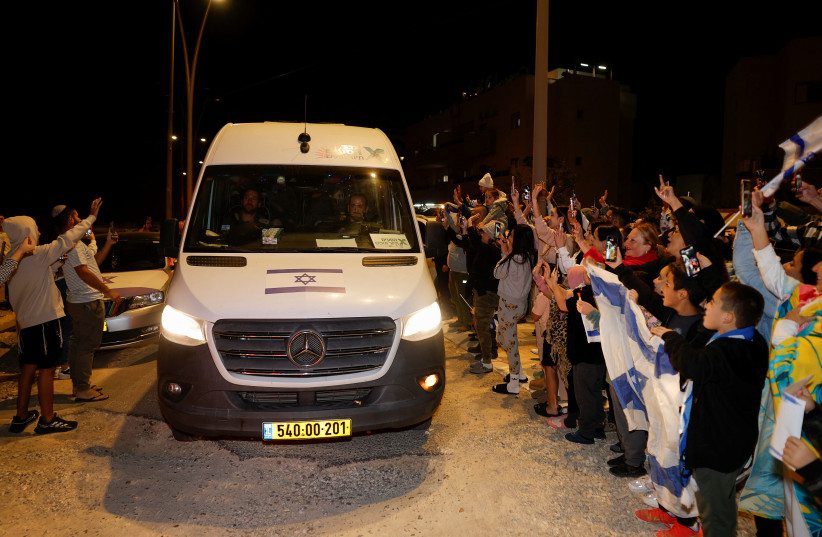It is not a rhetorical overstatement to say that Swords of Iron, the war in Gaza, is an existential battle. It is a war that has been thrust upon us and demands an existential solution.
What does that mean? A recent editorial in this newspaper stipulated the two paramount priorities of this conflict: defeating Hamas and securing our hostages. There is consensus and perhaps even across-the-board agreement here in Israel.
The editorial also said that both goals must be pursued, and both achieved. Also agreed.
But now we get to the hard part, and that is the implementation. How exactly do we pursue both goals? Can they be done in equal measure, simultaneously? Or do they require prioritizing in the name of achieving both goals?
I would submit that a close look at the two goals and the ability to best implement them leads to the inescapable conclusion that we must prioritize Hamas’s defeat. In fact, the only way that we can realistically achieve both goals is by first and foremost defeating Hamas.

We cannot return to the status quo ante
The ineluctable fact is that by prioritizing the freeing of hostages, we weaken and possibly even threaten the prospect of defeating Hamas. Conversely, prioritizing Hamas’s destruction strengthens and accelerates the likelihood of a full return of our hostages.
Why should that be? Simply because prioritizing the securing of hostages plays into Hamas’s plans for extending, for however long they can, a ceasefire. The implications of such an extension, one that conceivably would last for weeks, is not too hard to divine.
The bottom line is that there will be increasing calls for a permanent ceasefire.
Such calls will emanate largely from abroad, but also from those here who are solely or even primarily focused on the hostages’ release. Part of this is human nature: well, we have paused this long, and look what good things are coming from it. Plus this war is draining our economy. Let’s make it permanent and we can look forward to more and more good things.
But this call for a permanent ceasefire is also, and perhaps primarily, reflective of an agenda to neutralize Israel. It will restore something of an October 7 status quo ante, and there might even be widespread calls for the rebuilding of Gaza.
It requires no great crystal ball to divine how all of this would be disastrous for Israel. Hamas will have murdered and raped with impunity. The cost to them will be insignificant, as it pales in contrast to the fact that they would remain in power, free to rape and pillage again at a time of their choosing.
Those who favor the return of the hostages, regardless of the consequences to the war effort, must know that they are merely kicking the can of future abductions down the road; they are assuring that there will be more brutality, conceivably on an even more horrific level.
ON THE other hand, prioritizing the destruction of Hamas works toward effecting both goals. This is borne out by the fact that it was the military success by the IDF in eviscerating Hamas in North Gaza that brought Hamas to the table in the first place.
Ironically, and perhaps counter-intuitively, I strongly believe that refusing further truce extensions and returning to the field of battle will accelerate significantly the timeline of future hostage releases. Hamas will not have the luxury of calling the shots on the timing and the number of hostages to be released, something they will surely enjoy if there is a willingness to continue to pause.
I expect that there are those who criticize me for being heartless and not sufficiently focused on the welfare of the hostages. Quite the contrary. Precisely because I share the goal of securing their prompt release, I say the best way, the surest way of doing so, is to act, at least now and in the near term, as if there are no hostages.
Turn the IDF loose again and allow them to continue to degrade and destroy Hamas. Our leadership needs to do this promptly while explaining to those here and abroad the rationale and the wisdom for it.
Our soldiers certainly want that. Our citizens certainly want that. I think our leaders share that conviction, but they are vulnerable, perhaps all too vulnerable to foreign, i.e., American pressure.
There needs to be a profound and clear understanding that if Israel wakes up from this war with Hamas still in power in Gaza, it will be an existential nightmare for our country. The level of anger will be immense, as those whose sons and daughters made the ultimate sacrifice will say it was all in vain.
We cannot allow this. I am confident that because this realization is not hard to conjure up, we will not allow it.
But we will be required to summon up all of our clarity, political will, and determination to assure that the outcome is the one that we intuitively know needs to materialize.
We are at a critical juncture. I pray that we choose the path that will lead us to rapid redemption, justice, and victory.
The writer is chairman of the board of Im Tirtzu, and a director of the Israel Independence Fund.
